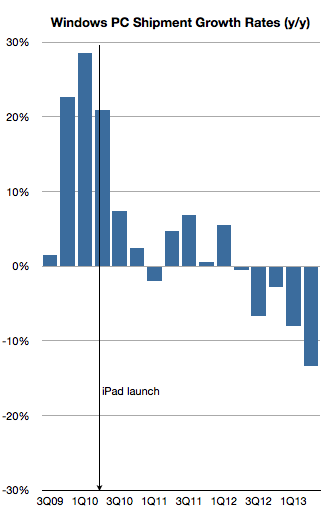The one event that destroyed the PC industry

Just as with the demise of the dinosaurs, many theories have been put forward as to why the PC industry ground to a sudden halt the way it did. Some blamed consumer boredom with Windows, while other pointed the finger at an overall flaccid economy, while pointed to the ethereal 'post-PC' shift. Others weaved more elaborate models revolving around Moore's law or even changing aesthetics.
While these factors may have played a part in the implosion of PC sales, a chart published by analyst firm Asymco leaves us with no doubt as to what catalyzed the catastrophe – the iPad.
Since its launch in April 2010, worldwide PC shipments have been in freefall, with year-on-year percentage growth that was once in strong double-digit territory now having nosedived quite alarmingly into negative double-digit terrain.

So, while there's little doubt that we've shifted from an era dominated by the PC to one ruled by post-PC devices, this shift clearly coincides with the introduction of the iPad.
Tablets have, in one form or another, been around for decades. Microsoft has tried – and failed – on several occasions to take them mainstream. But it was Apple's iPad – with that name that many thought would doom it to failure – which took the idea of a tablet computer and transformed it into a marketable, successful product.
This, in turn, paved the way for Android-powered slates, and then devices powered by Windows RT and Windows 8.
What didn't help following the launch of the iPad was the way that Microsoft, along with its hardware partners, started furiously churning out expansive, poor quality tablets that OEMs could only convince consumers to buy by offering them at firesale prices. This confusion allowed the iPad to gain ground on the PC, and cemented its position as a game changer.
What's interesting are the suggestions that the post-PC industry could also be headed for stagnation, as the high-end smartphone market becomes crowded. If this turns out to be the case, then beleaguered PC firms scrabbling for new markets could find themselves leaping headlong into another imploding market.